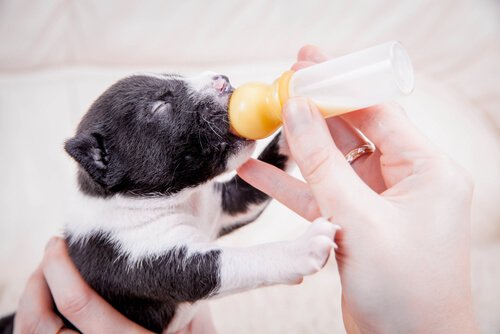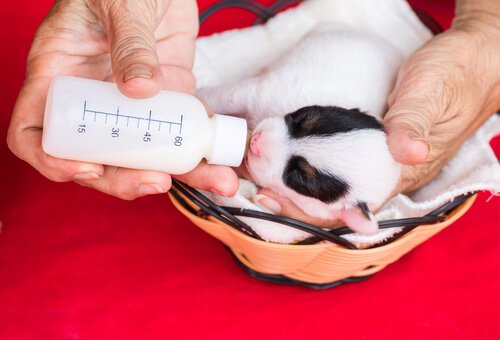When Should You Bottle-feed a Puppy?

If your dog has had puppies, there may be several circumstances that would make it necessary for you to bottle-feed a puppy. This is not usually the general rule. However, in the case of an exception, you need to be informed about what might happen.
In what cases should you bottle-feed?
You know that in order for a puppy to imprint well, it would better for the puppies to grow up with their mother and siblings until the age of two and a half months, but this is not always possible due to several circumstances. Here are some of them:
The puppy could be an orphan
Sometimes a female dog could die during childbirth and her puppies would be left helpless. Does that mean they must die of hunger? Obviously not, especially if they have you around to prevent it. Here are some of the main cases in which you have to feed a puppy with a bottle:
Lack of milk
If the litter is large, it’s possible that the mother might not have enough milk for her litter. It’s necessary for the puppies to drink their mother’s milk until they’re full. So in case their mother runs out, it will be necessary to supplement their diet with formula.

Poor quality milk
This is something that doesn’t that often. Sometimes mothers produce poor quality milk, due to it not maturing or even because of an unknown infection or disease.
In this case, poor quality milk would cause the puppies to become dehydrated and malnourished, which would cause them to lose weight rather than gain weight (which is what normally happens).
How do you feed a puppy with a bottle?
In the extreme cases that you have to bottle-feed a puppy by force, you must know how to properly do it and with what in order for this type of diet could help the puppy develop healthily.
Using a formula
This is a very important point because a puppy’s stomach isn’t able to assimilate just any kind of milk, much less that of the cow. So, if you need to bottle-feed a puppy, talk to your vet, but by no means should you give them cow’s milk.
Therefore, you will have to give the puppies a special formula that you can get in pet stores and veterinary clinics. There formulas of different qualitys and you can be successful in raising the puppies, even if you only feed them formula.
Choose a bottle
This is another important point to consider because using the human baby bottle will not work either. Consider that when the puppies come into the world, they are no more than 10 centimeters long. Therefore, their mouths will be smaller than that of a baby. As a result, they require certian characteristics for their bottles.

Additionally, bottles that are especially designed for puppies have precise measurements that can help you to find out the amout of formula you feed your puppy. The veterinarian will be the one to determine this. Also, he/she can help and guide you on which bottle will be the best type for your puppies.
How to bottle-feed a puppy
This is very easy because you can do it in your own bed while lying down as if you were going to sleep. You don’t have to pick them up because a puppy’s natural position as they breastfeed would be lying down. So, if they’re in this position, they can easily latch on to the bottle.
After bottle-feeding the puppy, you have to watch the puppy to make sure they defecate at most one hour after feeding . If this does not happen, you will have to massage their belly and anus with a warm damp cloth. This will help stimulate the digestive system.
It’s really unfortuante if your puppies have been orphaned. Still, focus on them and help them to go foward in life. It’s not difficult to bottle-feed a puppy. It will only require a little time and effort during their first months of life.